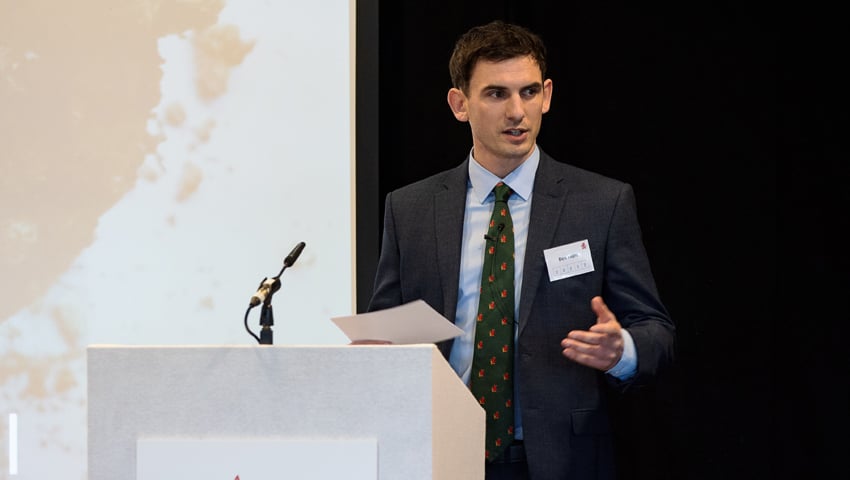Farm advisor Ben Hunt NSch 2022 has published his Nuffield Farming report entitled “Can you farm carbon?”, sponsored by the John Oldacre Foundation.
As part of his Scholarship, Ben travelled to the Netherlands, Belgium, France, Denmark, USA, Canada, UK. He investigated soil carbon markets (SCMs) overseas to understand how they are overcoming greenwash, and to establish guidance for their use in the UK.
Hunt said, “The emerging soil carbon market (SCM) has generated much enthusiasm. Companies pay farmers to adopt practices that remove atmospheric carbon into the soil (carbon farming), offsetting companies’ emissions.”
He identifies that while SCMs can seem like an opportunity to improve farm productivity, environmental performance, climate resilience, and mitigate emissions, they also come with the risk of greenwash.
“In reality, these projects weren’t really addressing these challenges and exhibited issues regarding additionality and permanence. Most farmers had adopted all or most of the accredited carbon farming practices in the past, rather than adopting new practices, indicating minimal additional carbon storage. Substantially higher carbon pricing is likely needed to drive material change. Otherwise, companies gain credit for farmers’ existing actions – a form of greenwashing that farmers risk getting embroiled in.”
So can you farm carbon? Ben believes so. He said, “Adopting carbon farming practices could demonstrably boost soil carbon with myriad benefits. But the scale of its potential climate impact remains debated. Therefore, climate change mitigation is currently best seen as a potential co-benefit, not the primary focus of carbon farming.”
Ben also asks if SCMs hold the key to unlocking wide-scale adoption of carbon farming. He said, “SCMs are nascent, they may play a modest future role if integrity and carbon pricing improve. Currently though, risks seem to outweigh opportunities for farmers. However, risks can be mitigated by pursuing non-offset carbon markets like insetting, which have fewer restrictions.
“SCMs are not the panacea I once thought for agricultural transformation. But they may contribute future solutions alongside regulation, policy, entrepreneur-led innovation (‘regenpreneurship’), new markets and social cooperatives. Sustainable farming requires diverse solutions and co-ordinated efforts.”
The study objectives were to investigate nascent soil carbon markets (SCMs) overseas to understand how they are seemingly making a success of SCMs and overcoming challenges of greenwash – assess the potential for SCMs to financially stimulate farmers to adopt new carbon farming practices – and provide guidance to farmers and the industry on the opportunities and risks of SCMs.
Key messages:
- Farmers face increasing challenges and must spearhead internal transformation of the sector.
- SCMs are not the transformative panacea I had envisioned. It is uncertain whether the offset SCM will be a suitable instrument for driving genuine climate
- impact, or agricultural transformation. It could play a modest future role if integrity and carbon pricing improve.
- Offset SCMs face substantial challenges of ‘greenwash’, with additionality and permanence the biggest issues.
- The risks of the offset SCM currently outweigh opportunities.
- Farmers can mitigate risks by pursuing non-offset based SCMs, like insetting.
- Policy, entrepreneur-led innovation (regenpreneurship), new markets and social cooperatives are vital levers for transforming the agricultural sector.
The full report is now available on the Nuffield Farming report library and his report video is available on the Nuffield Farming YouTube channel. Ben presented the findings of his report at the 2023 Nuffield Farming Conference in Exeter.
